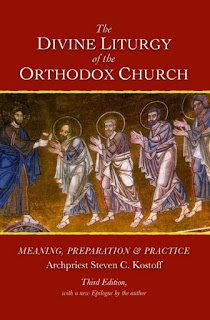Dear Parish Faithful & Friends in Christ,
"The divine liturgy is truly a heavenly service on earth, in which God himself, in a particular, immediate and most clear manner is present and dwells with men, for he himself is the invisible celebrant of the service; he is both the offerer and the offering. There is on earth nothing higher, greater, more holy, than the liturgy; nothing more solemn, nothing more life-giving."
- St. John of Kronstadt
Keeping the words of Fr. John of Kronstadt in mind, I am going to offer a "few" homilies in the upcoming weeks on the meaning and practice of the Divine Liturgy. By way of reminder, and by way of keeping those who were not at yesterday's Liturgy informed of what I began with, I am simply summarizing the major points from yesterday - both from the Liturgy and the post-Liturgy discussion.
I did remind everyone at the outset of the homily that it could seem like we were merely reviewing what we already knew for the most part. But in the Church to review means to renew - to renew our commitment to Christ, to the Church, and to our deepest possible experience that is offered to us in the Divine Liturgy. Renewal is an ongoing process that is essential in our relationship with God. In short, to review is to renew.
+ The Liturgy of St. John Chrysostom as served and celebrated today, is the result of a long process of development. — From the apostolic "breaking of bread" to the ongoing experience of the Liturgy to this day, we find a remarkable continuity of meaning and experience. The Liturgy is identical with itself all through the history of the Church. We all experience the same presence of Christ and the reception of the Eucharist as did the earliest Christians in the apostolic Church. On that level the Liturgy is unchanging. Yet, there have been many changes, additions, embellishments and expansive elements in the outward form of the Liturgy. We are essentially serving a Byzantine-style Liturgy that did not reach its completed form until the late medieval period within the context of the Eastern Christian world, centered in Constantinople, now Istanbul. You can trace this development in a fine book by Hugh Wybreth on the Liturgy.
+ The very title of "Divine Liturgy" is deeply meaningful. — Liturgy is from the Gk. leitourgia meaning the "common action" or "common work" of the assembled people. This is just one more word from the realm of ancient Greek culture "baptized" by the Church to now refer to the assembly of the Christian faithful prepared to offer its "common action/work" of being the People of God and Body of Christ - the Church - in a given local setting. Liturgy is something that we do. There are no passive participants. By praying together with the prayers of the Liturgy and sealing those common prayers with our collective "amen," we are all doing something in common and communal. To come to church is "to liturgize" within the framework of the Liturgy.
+ The Liturgy is "divine" because it is ultimately from God. — We gather to worship the living God - the Father, and the Son, and the Holy Spirit. The Liturgy is about God before it is about us. This sense of the holiness of God pervades the Liturgy: "Holy! Holy! Holy! Lord God of Sabbaoth!" If we actualize the presence of Christ in the Liturgy, then Christ is the Gift of God to us and for us. We are thus working with God in the Liturgy as we prepare to encounter Christ in the Gospel and in the Eucharist.
+ We begin the Liturgy with the solemn doxology: "Blessed is the Kingdom of the Father, and of the Son and of the Holy Spirit..." Our destination is announced from the beginning. — The Kingdom of God is an already present reality that we perhaps most clearly perceive and experience precisely in the Liturgy. We "ascend" into the Kingdom in the Liturgy and from the heavenly banquet table we receive and partake of the the Lamb of God "slain before the foundation of the world." We thus anticipate the Kingdom that will come at the end of history here and now in the Liturgy. We even "remember" the "second and glorious coming" in the anamnesis.
+ St. John of Kronstadt has got it right: there is nothing comparable to the Liturgy for Orthodox Christians. — It is the heart and soul of parish life from which everything else flows outwardly into our lives and into the world as we carry it with us when we "depart in peace."
+ Next Sunday, I will concentrate on the first part of the Liturgy culminating with the reading of the Scriptures.








